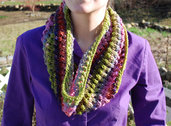Currently my herb garden still remains rather desolate and sad. But there is a pot of chives on my deck that is happily  letting me know that spring has indeed sprung. (Now if the weather would just co-operate a little bit more…) They are also showing me that they will need to be divided this year but that is not going to be a problem seeing that this past winter cracked their terra-cotta pot in several places.
letting me know that spring has indeed sprung. (Now if the weather would just co-operate a little bit more…) They are also showing me that they will need to be divided this year but that is not going to be a problem seeing that this past winter cracked their terra-cotta pot in several places.
This pot of chives is quite dear to me as I started them from seed over 10 years ago. Over the years and moves we have made I have divided this clump of chives repeatedly and it has never ceased rewarding me with its tasty leaves and flowers.
On top of being good to eat as well as their pretty flowers, chives are also an easy to grow companion plant. Companion plants are any particular pairing of plants that actually help each other out in various ways. Be it some help repel pests with their potent scent (think garlic as well as chives and onions) while others help to attract pollinators and other beneficial insects with their nectar rich flowers. I have heard that chives are supposed to keep Japanese beetles at bay. I do not know how true this may be but an interesting experiment would be to plant some underneath a rose bush seeing that roses can be plagued by both Japanese beetles as well as aphids. Aphids are also suppose to be detered by a planting of chives. In my garden chives are always one of the first herbs to bloom which is also good for the beneficial insects that are searching out nectar for food come early spring.
Companion planting is something I find to be very fascinating and have been incorporating it into my garden more and more each year. Something appears to be working too as last year we saw an incredible amount of ladybugs in the garden as well as unusually small amount of pests. This year I intend to elaborate on companion planting even more throughout my garden and hope to give continuous updates here on this blog.
For those that might be interested in learning more about companion planting I highly recommend the book Great Garden Companions by Sally Jean Cunningham as well as the Wikipedia link on companion plants that can be found here. It has an excellent and easy to read chart stating various companion plants and what they are useful for. Also here is a link to preview the above mentioned book courtsey of Google Book Search.
Happy Organic Gardening!











{ 8 comments… read them below or add one }